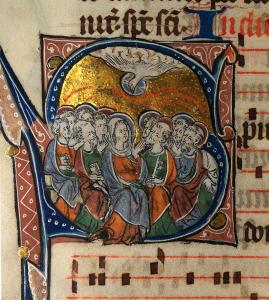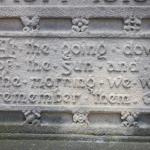
This post reflects upon the import of Pentecost season for ordering your and my everyday life for maximum growth.
Fear of the Holy Ghost in Our Secular Age
I remember tucking my daughter Julianne into bed one night when she was a little girl. She asked me to protect her from the Holy Ghost. No doubt mention of the Holy Spirit in my good night prayers conjured up all kinds of scary notions of ghosts. No doubt, my daughter wasn’t thinking the Spirit orders our lives for maximum growth! I sought to assure her that the Holy Ghost or Holy Spirit protects her from evil as I prayed blessings on her for a good night sleep.
It is not just little children who are afraid or at least wary of the Holy Ghost. Many individuals suspect that the Holy Ghost or Holy Spirit and the Christian faith more generally mortify our ordinary desires. They maintain that the Christian faith mutilates the fulfilment of everyday existence.
Charles Taylor writes about this theme in A Secular Age: “The critique of Christianity has taken this centrality of the body, the ineliminability of our ordinary bodily fulfilments, and turned it against the faith itself, stigmatising it as a transform of Platonism” (page 640). He references Friedrich Nietzsche and Martha Nussbaum’s critiques as distinctive examples of this line of argument.
Taylor goes on to write of “two, seemingly contradictory accusations against religious faith,” namely, the “mortification of ordinary human life,” and the sanitization of the dark side of human nature (640-641). We will focus our attention primarily on the first accusation or critique in this post, that is mortification or mutilation.
Fulfilment of Everyday Life and Ordinary Desire
Taylor, a Roman Catholic, is well aware and brutally honest about Christianity’s failings over the centuries. He also sees the good in modern, secular culture, including its rightful concern for the following: “Running through modern culture is the sense of the wrong we do, in pursuing our highest ideals, when we sacrifice the body, or ordinary desire, or the fulfillments of everyday life” (page 640).
Taylor accounts for the rightful critical analysis of Christianity’s missteps involving mortification or mutilation of the body or ordinary desire. But he also makes clear that
a religion of Incarnation cannot simply sideline the body. The “pity” ascribed to Jesus in the Gospel is a gut feeling; the eschatological perspective is for bodily resurrection. The Reformation accent on ordinary life goes much farther than Aristotle, not only making the sphere of production and the family part of the good life, but giving it a dignity which Aristotle had not accorded it. It is not surprising that a central tradition of Catholic philosophy from the Middle Ages grounded itself on Aristotle’s philosophy (page 640).
It is worth noting here that several sentences earlier Taylor points out that Aristotle was quite critical of Plato’s “attempt to excise certain ordinary fulfillments from the good life, and in the Politics, Book 2, utterly rejects the Platonic proposal to abolish the family and private property” (page 640). While there are certainly renditions of Christian faith that lead in a Platonic direction, it is by no means universal, and the Scriptures themselves place significant emphasis on a fully embodied spirituality.
Paying Tribute to the Holy Spirit’s Work in Creaturely Life
Taylor could have certainly paid tribute to the Holy Ghost or Holy Spirit along these lines in this section. According to Genesis 1, the Spirit hovers over the waters at the outset of creation (Genesis 1:2). In Genesis 2, God breathes life into humanity in our embodied estate. The Spirit is often understood to be the divine person who breathes life and new life into humanity (Genesis 2:7; Ezekiel 37:14).
In the New Testament, we find that Jesus, the incarnate One, is conceived in Mary, by the Holy Spirit (Matthew 1:20). If John the Baptist is full of the Spirit while even in the womb (Luke 1:15), surely Jesus grows up under the guidance of the Holy Spirit as he becomes strong in spirit (Luke 2:40). God also raises Jesus bodily from the dead by the Holy Spirit (Romans 8:11).
We find the Holy Spirit present at the transformation of the entire creation at the close of the Book of Revelation (Revelation 22:17). To return briefly to Genesis, a dove returns to the Ark with a fresh olive leaf following the devastation of the earth by flooding (Genesis 8:11). Thus, it is fitting that the dove is often taken to symbolize the Holy Spirit, the giver of new life. The Spirit appears in the form of a dove in Jesus’ baptism account. This same imaging of the Spirit is on display in this post’s featured image illustrating Pentecost.
The Spirit Vs. the Sanitization of Humanity’s Dark Side of Existence
From the reverse angle, we find evidence of the Scriptures contending against what Taylor refers to as the sanitization of humanity’s dark side. The Spirit leads Jesus to be tempted by the Spirit in the wilderness, even while preserving him in the midst of temptation (Luke 4:1). The Spirit is also instrumental in Jesus’ crucifixion when the Lord offers himself up on our behalf to bring about our cleansing and redemption of our daily lives (Hebrews 9:14).
Throughout his life, Jesus lives among sinful people, sharing life with them, bringing about healing and deliverance from demonic dimensions of existence. Jesus led by the Spirit does not minimize or sanitize our suffering. He rolls up his sleeves and gets involved in our messy lives. The Lord addresses our deepest needs from within our daily life situations. He brings transformation to human life in and through the Holy Spirit (Matthew 12:28; Luke 4:18, 21).
The Day of Pentecost and the Affirmation of Material and Cultural Reality
The same emphasis on the Spirit bringing new life to material and cultural reality is on display in Acts chapter 2:5-11 at Pentecost. The Spirit descends on the apostolic community with tongues of fire to speak in the languages of all the people gathered in Jerusalem. They do not speak forth God’s glory in a heavenly tongue(s), which would have been unrecognizable to those who were present for the festival of Pentecost. Rather, they speak in earthly languages known to those were gathered:
Now there were staying in Jerusalem God-fearing Jews from every nation under heaven. When they heard this sound, a crowd came together in bewilderment, because each one heard their own language being spoken. Utterly amazed, they asked: “Aren’t all these who are speaking Galileans? Then how is it that each of us hears them in our native language? Parthians, Medes and Elamites; residents of Mesopotamia, Judea and Cappadocia, Pontus and Asia, Phrygia and Pamphylia, Egypt and the parts of Libya near Cyrene; visitors from Rome (both Jews and converts to Judaism); Cretans and Arabs—we hear them declaring the wonders of God in our own tongues!” (Acts 2:5-11; NIV)
Unlike the Roman Empire which suppressed local languages and tongues in service to Rome’s domineering, latinized ambitions, God celebrates indigenous reality. God’s Holy Ghost or Holy Spirit does not eradicate ordinary human life and culture but transforms and perfects it.
The Spirit’s Ordering of Life for Maximum Growth
Contrary to how some Christians think and pray, God does not dismiss our prayers and desires involving daily needs, family life, and career paths.
Jesus calls on us to seek first God’s kingdom (Matthew 6:33), not only God’s kingdom. As we seek first God’s kingdom, God grants us all other things that we need and brings about fullness in God’s way and time to our various desires. Jesus calls us to pray for God’s kingdom to come and will to be done on earth as it is in heaven (Matthew 6:10). He does not discount earth in view of heaven. Jesus invites us to pray that God will grant us our daily bread (Matthew 6:11) and other needs rather than fret about them, since God cares so deeply for us (Matthew 6:25-32).
In view of Jesus’ view of creaturely life and God’s kingdom in our midst, we need to cultivate an earthly, embodied spirituality. Such embodied spirituality will transform our prayer lives. People I know well and who hardly know me reach out in view of what I share about our own family trials involving suffering to share about their various struggles and pains. They ask me for prayer, just as I ask them and others to pray for us. What a privilege it is to share life with them in whatever way possible as we cope and find hope together amid sorrow in pursuit of holistic fullness.
The Spirit of Jesus Christ does not seek to eradicate our ordinary daily lives and desires. The Spirit orders and reorders them so we might flourish now and eternity and experience maximum growth to whatever degree possible here and now in view of there and then.
Pentecost Season and Ordinary Time
Here it is worth noting that the season of Pentecost does not end anytime soon. Rather, it continues until the end of the liturgical calendar when we celebrate Jesus’ second coming and the beginning of Advent. It is also important to note that the ensuing months before us also stand under the liturgical marker of “Ordinary Time,” which conveys the sense of ordered life.
Paul reminds us that the Holy Ghost or Holy Spirit that God has given us is not one to invoke fear in children or make adults timid. Rather, the Spirit that God has bestowed on us “gives us power, love and self-discipline.” (2 Timothy 1:7; NIV) No doubt, some will see self-discipline and self-control as debilitating. I beg to differ. Submission to the Holy Spirit leads to fullness of life.
The Spirit’s Work and Neuroplasticity
Some of you are aware that we have been coping with my adult son Christopher’s traumatic brain injury for over three years. Not only are we coping, but also, we are praying and hoping and tirelessly working in pursuit of meaningful recovery. So many others have joined us on this journey for which we are ever grateful. Just as the Spirit fires and rewires our spiritual circuits, so we are praying that the neurons in Christopher’s brain will fire and rewire in a process known as neuroplasticity.
I have learned so much about the human body and brain through this ordeal. I have also learned a great deal about how God seeks to heal the human body, mind, emotions, and family. It is a testament to God’s abundant grace, the medical community’s skill, and people’s goodwill that my son is not dead, that he is slowly, painstakingly slowly making progress. Due to the Spirit’s empowerment, love, and gift of self-discipline, my family and I have survived and are in some ways thriving. God’s Spirit is in the process of firing and rewiring our lives to bring about homeostasis and maximum growth in our daily existence. Call it a form of spiritual and relational neuroplasticity.
No matter what befalls you and me, the Spirit of God seeks us out to heal and transform our lives. Far from mutilating us, the Spirit seeks to mobilize you and me and order our everyday lives for maximum growth.
*******
For those interested in reading the various updates on our family journey with TBI, please click here on this link. Thank you for your prayers for Christopher, his wife, daughter, mother, sister, and me! God bless you all abundantly!














